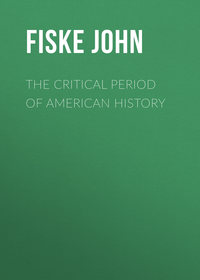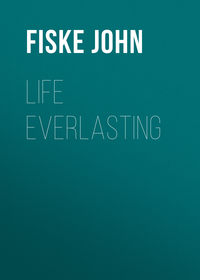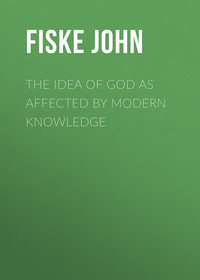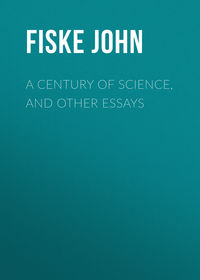 полная версия
полная версияThrough Nature to God

John Fiske
Through Nature to God
PREFACE
A single purpose runs throughout this little book, though different aspects of it are treated in the three several parts. The first part, "The Mystery of Evil," written soon after "The Idea of God," was designed to supply some considerations which for the sake of conciseness had been omitted from that book. Its close kinship with the second part, "The Cosmic Roots of Love and Self-Sacrifice," will be at once apparent to the reader.
That second part is, with a few slight changes, the Phi Beta Kappa oration delivered by me at Harvard University, in June, 1895. Its original title was "Ethics in the Cosmic Process," and its form of statement was partly determined by the fact that it was intended as a reply to Huxley's famous Romanes lecture delivered at the University of Oxford in 1893. Readers of "The Destiny of Man" will observe that I have here repeated a portion of the argument of that book. The detection of the part played by the lengthening of infancy in the genesis of the human race is my own especial contribution to the Doctrine of Evolution, so that I naturally feel somewhat uncertain as to how far that subject is generally understood, and how far a brief allusion to it will suffice. It therefore seemed best to recapitulate the argument while indicating its bearing upon the ethics of the Cosmic Process.
I can never cease to regret that Huxley should have passed away without seeing my argument and giving me the benefit of his comments. The subject is one of a kind which we loved to discuss on quiet Sunday evenings at his fireside in London, many years ago. I have observed on Huxley's part, not only in the Romanes lecture, but also in the charming "Prolegomena," written in 1894, a tendency to use the phrase "cosmic process" in a restricted sense as equivalent to "natural selection;" and doubtless if due allowance were made for that circumstance, the appearance of antagonism between us would be greatly diminished. In our many talks, however, I always felt that, along with abundant general sympathy, there was a discernible difference in mental attitude. Upon the proposition that "the foundation of morality is to … give up pretending to believe that for which there is no evidence," we were heartily agreed. But I often found myself more strongly inclined than my dear friend to ask the Tennysonian question: —
"Who forged that other influence,That heat of inward evidence,By which he doubts against the sense?"In the third part of the present little book, "The Everlasting Reality of Religion," my aim is to show that "that other influence," that inward conviction, the craving for a final cause, the theistic assumption, is itself one of the master facts of the universe, and as much entitled to respect as any fact in physical nature can possibly be. The argument flashed upon me about ten years ago, while reading Herbert Spencer's controversy with Frederic Harrison concerning the nature and reality of religion. Because Spencer derived historically the greater part of the modern belief in an Unseen World from the savage's primeval world of dreams and ghosts, some of his critics maintained that logical consistency required him to dismiss the modern belief as utterly false; otherwise he would be guilty of seeking to evolve truth from false-hood. By no means, replied Spencer: "Contrariwise, the ultimate form of the religious consciousness is the final development of a consciousness which at the outset contained a germ of truth obscured by multitudinous errors." This suggestion has borne fruit in the third part of the present volume, where I have introduced a wholly new line of argument to show that the Doctrine of Evolution, properly understood, does not leave the scales equally balanced between Materialism and Theism, but irredeemably discredits the former, while it places the latter upon a firmer foundation than it has ever before occupied.
My reference to the French materialism of the eighteenth century, in its contrast with the theism of Voltaire, is intended to point the stronger contrast between the feeble survivals of that materialism in our time and the unshakable theism which is in harmony with the Doctrine of Evolution. When some naturalist like Haeckel assures us that as evolutionists we are bound to believe that death ends all, it is a great mistake to hold the Doctrine of Evolution responsible for such a statement. Haeckel's opinion was never reached through a scientific study of evolution; it is nothing but an echo from the French speculation of the eighteenth century. Such a writer as La Mettrie proceeded upon the assumption that no belief concerning anything in the heavens above, or the earth beneath, or the waters under the earth, is worthy of serious consideration unless it can be demonstrated by the methods employed in physical science. Such a mental attitude was natural enough at a time when the mediæval theory of the world was falling into discredit, while astronomy and physics were winning brilliant victories through the use of new methods. It was an attitude likely to endure so long as the old-fashioned fragmentary and piecemeal habits of studying nature were persisted in; and the change did not come until the latter half of the nineteenth century.
The encyclopædic attainments of Alexander von Humboldt, for example, left him, to all intents and purposes, a materialist of the eighteenth century. But shortly before the death of that great German scholar, there appeared the English book which heralded a complete reversal of the attitude of science. The "Principles of Psychology," published in 1855 by Herbert Spencer, was the first application of the theory of evolution on a grand scale. Taken in connection with the discoveries of natural selection, of spectrum analysis, and of the mechanical equivalence between molar and molecular motions, it led the way to that sublime conception of the Unity of Nature by which the minds of scientific thinkers are now coming to be dominated. The attitude of mind which expressed itself in a great encyclopædic book without any pervading principle of unity, like Humboldt's "Kosmos," is now become what the Germans call ein ueberwundener Standpunkt, or something that we have passed by and left behind.
When we have once thoroughly grasped the monotheistic conception of the universe as an organic whole, animated by the omnipresent spirit of God, we have forever taken leave of that materialism to which the universe was merely an endless multitude of phenomena. We begin to catch glimpses of the meaning and dramatic purpose of things; at all events we rest assured that there really is such a meaning. Though the history of our lives, and of all life upon our planet, as written down by the unswerving finger of Nature, may exhibit all events and their final purpose in unmistakable sequence, yet to our limited vision the several fragments of the record, like the leaves of the Cumæan sibyl, caught by the fitful breezes of circumstance and whirled wantonly hither and thither, lie in such intricate confusion that no ingenuity can enable us wholly to decipher the legend. But could we attain to a knowledge commensurate with the reality – could we penetrate the hidden depths where, according to Dante (Paradiso, xxxiii. 85), the story of Nature, no longer scattered in truant leaves, is bound with divine love in a mystic volume, we should find therein no traces of hazard or incongruity. From man's origin we gather hints of his destiny, and the study of evolution leads our thoughts through Nature to God.
Cambridge, March 2, 1899.
THE MYSTERY OF EVIL
I am the Lord, and there is none else. I form the light, and create darkness; I make peace, and create evil. I the Lord do all these things. – Isaiah, xiv. 6, 7.
Did not our God bring all this evil upon us? – Nehemiah, xiii. 18.
Οὐκ ἔοικε δ’ ἡ φύσις ἐπεισοδιώδης οὖσα ἐκ τῶν φαινομένων, ὥσπερ μοχθηρὰ τραγῳδία. – Aristotle, Metaphysica, xiii. 3.
I
The Serpent's Promise to the Woman
"Your eyes shall be opened, and ye shall be as gods, knowing good and evil." Genesis iii. 5.
The legend in which the serpent is represented as giving this counsel to the mother of mankind occurs at the beginning of the Pentateuch in the form which that collection of writings assumed after the return of the Jews from the captivity at Babylon, and there is good reason for believing that it was first placed there at that time. Allusions to Eden in the Old Testament literature are extremely scarce,1 and the story of Eve's temptation first assumes prominence in the writings of St. Paul. The marks of Zoroastrian thought in it have often been pointed out. This garden of Eden is a true Persian paradise, situated somewhere in that remote wonderland of Aryana Vaëjo to which all Iranian tradition is so fond of pointing back. The wily serpent is a genuine Parsee serpent, and the spirit which animates him is that of the malicious and tricksome Ahriman, who takes delight in going about after the good creator Ormuzd and spoiling his handiwork. He is not yet identified with the terrible Satan, the accusing angel who finds out men's evil thoughts and deeds. He is simply a mischief-maker, and the punishment meted out to him for his mischief reminds one of many a curious passage in the beast epos of primitive peoples. As in the stories which tell why the mole is blind or why the fox has a bushy tail, the serpent's conduct is made to account for some of his peculiar attributes. As a punishment he is made to crawl upon his belly, and be forever an object of especial dread and loathing to all the children of Eve.
What, then, is the crime for which the serpent Ahriman thus makes bitter expiation? In what way has he spoiled Ormuzd's last and most wonderful creation? He has introduced the sense of sin: the man and the woman are afraid, and hide themselves from their Lord whom they have offended. Yet he has been not altogether a deceiving serpent. In one respect he had spoken profound truth. The man and the woman have become as gods. In the Hebrew story Jehovah says, "Behold the man is become as one of us;" that is to say, one of the Elohim or heavenly host, who know the good and the evil. Man has apparently become a creature against whom precautions need to be taken. It is hinted that by eating of the other tree and acquiring immortal life he would achieve some result not in accordance with Jehovah's will, yet which it would then be too late to prevent. Accordingly, any such proceedings are forestalled by driving the man and woman from the garden, and placing sentinels there with a fiery sword which turns hither and thither to warn off all who would tread the path that leads to the tree of life. The anthropomorphism of the story is as vivid as in those Homeric scenes in which gods and men contend with one another in battle. It is plainly indicated that Jehovah's wrath is kindled at man's presumption in meddling with what belongs only to the Elohim; man is punished for his arrogance in the same spirit as when, later on, he gives his daughters in marriage to the sons of the Elohim and brings on a deluge, or when he strives to build a tower that will reach to heaven and is visited with a confusion of tongues. So here in Eden he has come to know too much, and Ahriman's heinous crime has consisted in helping him to this interdicted knowledge.
The serpent's promise to the woman was worthy of the wisest and most astute of animals. But with yet greater subtlety he might have declared, Except ye acquire the knowledge of good and evil, ye cannot come to be as gods; divine life can never be yours. Throughout the Christian world this legend of the lost paradise has figured as the story of the Fall of Man; and naturally, because of the theological use of it made by St. Paul, who first lifted the story into prominence in illustrating his theory of Christ as the second Adam: since by man came death into the world, by man came also the resurrection from death and from sin. That there is truth of the most vital sort in the Pauline theory is undeniable; but there are many things that will bear looking at from opposite points of view, for aspects of truth are often to be found on both sides of the shield, and there is a sense in which we may regard the loss of paradise as in itself the beginning of the Rise of Man. For this, indeed, we have already found some justification in the legend itself. It is in no spirit of paradox that I make this suggestion. The more patiently one scrutinizes the processes whereby things have come to be what they are, the more deeply is one impressed with its profound significance.
II
The Pilgrim's Burden
But before I can properly elucidate this view, and make clear what is meant by connecting the loss of innocence with the beginning of the Rise of Man, it is necessary to bestow a few words upon a well-worn theme, and recall to mind the helpless and hopeless bewilderment into which all theologies and all philosophies have been thrown by the problem of the existence of evil. From the ancient Greek and Hebrew thinkers who were saddened by the spectacle of wickedness insolent and unpunished, down to the aged Voltaire and the youthful Goethe who felt their theories of God's justice quite baffled by the Lisbon earthquake, or down to the atheistic pessimist of our own time who asserts that the Power which sustains the world is but a blind and terrible force without concern for man's welfare of body or of soul, – from first to last the history of philosophy teems with the mournful instances of this discouragement. In that tale of War and Peace wherein the fervid genius of Tolstoi has depicted scenes and characters of modern life with truthful grandeur like that of the ancient epic poems, when our friend, the genial and thoughtful hero of the story, stands in the public square at Moscow, uncertain of his fate, while the kindly bright-faced peasant and the eager pale young mechanic are shot dead by his side, and all for a silly suspicion on the part of Napoleon's soldiery; as he stands and sees the bodies, still warm and quivering, tossed into a trench and loose earth hastily shovelled over them, his manly heart surges in rebellion against a world in which such things can be, and a voice within him cries out, – not in the mood in which the fool crieth, but with the anguish of a tender soul wrung by the sight of stupendous iniquity, – "There is no God!" It is but the utterance of an old-world feeling, natural enough to hard-pressed and sorely tried humanity in those moments that have come to it only too often, when triumphant wrong is dreadfully real and close at hand, while anything like compensation seems shadowy and doubtful and far away.
It is this feeling that has created the belief in a devil, an adversary to the good God, an adversary hard to conquer or baffle. The feeling underlies every theological creed, and in every system of philosophy we find it lurking somewhere. In these dark regions of thought, which science has such scanty means for exploring, the statements which make up a creed are apt to be the outgrowth of such an all-pervading sentiment, while their form will be found to vary with the knowledge of nature – meagre enough at all times, and even in our boasted time – which happens to characterize the age in which they are made. Hence, well-nigh universally has philosophy proceeded upon the assumption, whether tacit or avowed, that pain and wrong are things hard to be reconciled with the theory that the world is created and ruled by a Being at once all-powerful and all-benevolent. Why does such a Being permit the misery that we behold encompassing us on every side? When we would fain believe that God is love indeed, and love creation's final law, how comes it that nature, red in tooth and claw with ravine, shrieks against our creed? If this question could be fairly answered, does it not seem as if the burden of life, which so often seems intolerable, would forthwith slip from our shoulders, and leave us, like Bunyan's pilgrim, free and bold and light-hearted to contend against all the ills of the world?
Ever since human intelligence became enlightened enough to grope for a meaning and purpose in human life, this problem of the existence of evil has been the burden of man. In the effort to throw it off, leaders of thought have had recourse to almost every imaginable device. It has usually been found necessary to represent the Creator as finite either in power or in goodness, although the limitation is seldom avowed, except by writers who have a leaning toward atheism and take a grim pleasure in pointing out flaws in the constitution of things. Among modern writers the most conspicuous instance of this temper is afforded by that much too positive philosopher Auguste Comte, who would fain have tipped the earth's axis at a different angle and altered the arrangements of nature in many fanciful ways. He was like Alphonso, the learned king of Castile, who regretted that he had not been present when the world was created, – he could have given such excellent advice!
In a very different mood the great Leibnitz, in his famous theory of optimism, argued that a perfect world is in the nature of things impossible, but that the world in which we live is the best of possible worlds. The limitation of the Creator's power is made somewhat more explicitly by Plato, who regarded the world as the imperfect realization of a Divine Idea that in itself is perfect. It is owing to the intractableness and vileness of matter that the Divine Idea finds itself so imperfectly realized. Thus the Creator's power is limited by the nature of the material out of which he makes the world. In other words, the world in which we live is the best the Creator could make out of the wretched material at his disposal. This Platonic view is closely akin to that of Leibnitz, but is expressed in such wise as to lend itself more readily to myth-making. Matter is not only considered as what Dr. Martineau would call a "datum objective to God," but it is endowed with a diabolical character of its own.
III
Manichæism and Calvinism
It is but a step from this to the complicated personifications of Gnosticism, with its Demiurgus, or inferior spirit that created the world. By some of the Gnostics the Creator was held to be merely an inferior emanation from God, a notion which had a powerful indirect effect upon the shaping of Christian doctrine in the second and third centuries of our era. A similar thought appears in the mournful question asked by Tennyson's Arthur: —
"O me! for why is all around us hereAs if some lesser god had made the worldAnd had not force to shape it as he would?"But some Gnostics went so far as to hold that the world was originally created by the Devil, and is to be gradually purified and redeemed by the beneficent power of God as manifested through Jesus Christ. This notion is just the opposite to that of the Vendidad, which represents the world as coming into existence pure and perfect, only to be forthwith defiled by the trail of the serpent Ahriman. In both these opposing theories the divine power is distinctly and avowedly curtailed by the introduction of a rival power that is diabolical; upon this point Parsee and Gnostic are agreed. Distinct sources are postulated for the evil and the good. The one may be regarded as infinite in goodness, the other as infinite in badness, and the world in which we live is a product of the everlasting conflict between the two. This has been the fundamental idea in all Manichæan systems, and it is needless to say that it has always exerted a mighty influence upon Christian theology. The Christian conception of the Devil, as regards its deeper ethical aspect, has owed much to the Parsee conception of Ahriman. It can hardly be said, however, that there has been any coherent, closely reasoned, and generally accepted Christian theory of the subject. The notions just mentioned are in themselves too shadowy and vague, they bear too plainly the marks of their mythologic pedigree, to admit of being worked into such a coherent and closely reasoned theory. Christian thought has simply played fast and loose with these conceptions, speaking in one breath of divine omnipotence, and in the next alluding to the conflict between good and evil in language fraught with Manichæism.
In recent times Mr. John Stuart Mill has shown a marked preference for the Manichæan view, and has stated it with clearness and consistency, because he is not hampered by the feeling that he ought to reach one conclusion rather than another. Mr. Mill does not urge his view upon the reader, nor even defend it as his own view, but simply suggests it as perhaps the view which is for the theist most free from difficulties and contradictions. Mr. Mill does not, like the Manichæans, imagine a personified principle of evil; nor does he, like Plato, entertain a horror of what is sometimes, with amusing vehemence, stigmatized as "brute matter." He does not undertake to suggest how or why the divine power is limited; but he distinctly prefers the alternative which sacrifices the attribute of omnipotence in order to preserve in our conception of Deity the attribute of goodness. According to Mr. Mill, we may regard the all-wise and holy Deity as a creative energy that is perpetually at work in eliminating evil from the universe. His wisdom is perfect, his goodness is infinite, but his power is limited by some inexplicable viciousness in the original constitution of things which it must require a long succession of ages to overcome. In such a view Mr. Mill sees much that is ennobling. The humblest human being who resists an impulse to sin, or helps in the slightest degree to leave the world better than he found it, may actually be regarded as a participator in the creative work of God; and thus each act of human life acquires a solemn significance that is almost overwhelming to contemplate.
These suggestions of Mr. Mill are extremely interesting, because he was the last great modern thinker whose early training was not influenced by that prodigious expansion of scientific knowledge which, since the middle of the nineteenth century, has taken shape in the doctrine of evolution. This movement began early enough to determine the intellectual careers of eminent thinkers born between 1820 and 1830, such as Spencer and Huxley. Mr. Mill was a dozen years too old for this. He was born at nearly the same time as Mr. Darwin, but his mental habits were formed too soon for him to profit fully by the new movement of thought; and although his attitude toward the new ideas was hospitable, they never fructified in his mind. While his thinking has been of great value to the world, much of it belongs to an era which we have now left far behind. This is illustrated in the degree to which he was influenced by the speculations of Auguste Comte. Probably no two leaders of thought, whose dates of birth were scarcely a quarter of a century apart, were ever separated by such a stupendous gulf as that which intervenes between Auguste Comte and Herbert Spencer, and this fact may serve as an index to the rapidity of movement which has characterized the nineteenth century. Another illustration of the old-fashioned character of Mill's philosophy is to be seen in his use of Paley's argument from design in support of the belief in a beneficent Creator. Mill adopted this argument, and, as a professed free-thinker, carried it to the logical conclusion from which Paley, as a churchman, could not but shrink. This was the conclusion which I have already mentioned, that God's creative power has been limited by some inexplicable viciousness in the original constitution of things.
I feel as if one could not be too grateful to Mr. Mill for having so neatly and sharply stated, in modern language and with modern illustrations, this old conclusion, which after all is substantially that of Plato and the Gnostics. For the shock which such a clear, bold statement gives to our religious feelings is no greater than the shock with which it strikes counter to our modern scientific philosophy. Suppose we could bring back to earth a Calvinist of the seventeenth century and question him. He might well say that the God which Mr. Mill offers us, shorn of the attribute of omnipotence, is no God at all. He would say with the Hebrew prophet, that God has created the evil along with the good, and that he has done so for a purpose which human reason, could it once comprehend all the conditions of the case, would most surely approve as infinitely wise and holy. Our Calvinist would ask who is responsible for the original constitution of things if not the Creator himself, and in supposing anything essentially vicious in that constitution, have not Plato and the Gnostics and the Manichæans and Mr. Mill simply taken counsel of their ignorance? Nay, more, the Calvinist would declare that if we really understood the universe of which humanity is a part, we should find scientific justification for that supreme and victorious faith which cries, "Though he slay me, yet will I trust in him!" The man who has acquired such faith as this is the true freeman of the universe, clad in stoutest coat of mail against disaster and sophistry, – the man whom nothing can enslave, and whose guerdon is the serene happiness that can never be taken away.







